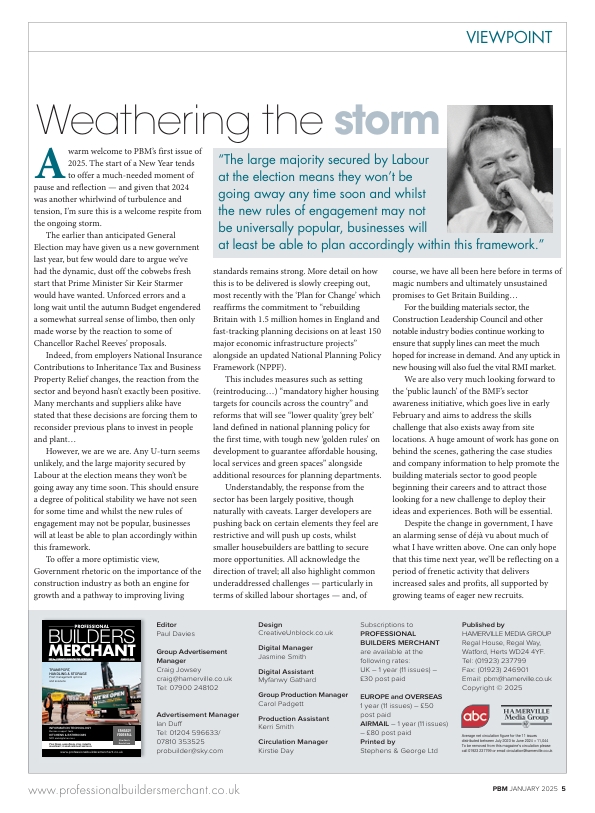
In the Viewpoint column of PBM’s January 2025 issue, editor Paul Davies reflects on the current state of the market.
A warm welcome to PBM’s first issue of 2025. The start of a New Year tends to offer a much-needed moment of pause and reflection — and given that 2024 was another whirlwind of turbulence and tension, I’m sure this is a welcome respite from the ongoing storm.
The earlier than anticipated General Election may have given us a new government last year, but few would dare to argue we’ve had the dynamic, dust off the cobwebs fresh start that Prime Minister Sir Keir Starmer would surely have wanted. Unforced errors and a long wait until the autumn Budget engendered a somewhat surreal sense of limbo, then only made worse by the reaction to some of Chancellor Rachel Reeves’ proposals.
Indeed, from employers National Insurance Contributions to Inheritance Tax and Business Property Relief changes, the reaction from the sector and beyond hasn’t exactly been positive. Many merchants and suppliers alike have stated that these decisions are forcing them to reconsider previous plans to invest in people and plant…
“The large majority secured by Labour at the election means they won’t be going away any time soon and whilst the new rules of engagement may not be universally popular, businesses will at least be able to plan accordingly within this framework.”
However, we are where we are. Any U-turn seems unlikely, and the large majority secured by Labour at the election means they won’t be going away any time soon. This should ensure a degree of political stability we have not seen for some time and whilst the new rules of engagement may not be popular, businesses will at least be able to plan accordingly within this framework.
To offer a more optimistic view, Government rhetoric on the importance of the construction industry as both an engine for growth and a pathway to improving living standards remains strong. More detail on how this is to be delivered is slowly creeping out, most recently with the ‘Plan for Change’ which reaffirms the commitment to “rebuilding Britain with 1.5 million homes in England and fast-tracking planning decisions on at least 150 major economic infrastructure projects” alongside an updated National Planning Policy Framework (NPPF).
This includes measures such as setting (reintroducing…) “mandatory higher housing targets for councils across the country” and reforms that will see “lower quality ‘grey belt’ land defined in national planning policy for the first time, with tough new ‘golden rules’ on development to guarantee affordable housing, local services and green spaces” alongside additional resources for planning departments.
Understandably, the response from the sector has been largely positive, though naturally with caveats. Larger developers are pushing back on certain elements they feel are restrictive and will push up costs, whilst smaller housebuilders are battling to secure more opportunities. All acknowledge the direction of travel; all also highlight common underaddressed challenges — particularly in terms of skilled labour shortages — and, of course, we have all been here before in terms of magic numbers and ultimately unsustained promises to Get Britain Building…
For the building materials sector, the Construction Leadership Council and other notable industry bodies continue working to ensure that supply lines can meet the much hoped for increase in demand. And any uptick in new housing will also fuel the vital RMI market.
We are also very much looking forward to the ‘public launch’ of the BMF’s sector awareness initiative, which goes live in early February and aims to address the skills challenge that also exists away from site locations. A huge amount of work has gone on behind the scenes, gathering the case studies and company information to help promote the building materials sector to good people beginning their careers and to attract those looking for a new challenge to deploy their ideas and experiences. Both will be essential.
Despite the change in government, I have an alarming sense of déjà vu about much of what has been written above. One can only hope that this time next year, we’ll be reflecting on a period of frenetic activity that delivers increased sales and profits, all supported by growing teams of eager new recruits.











